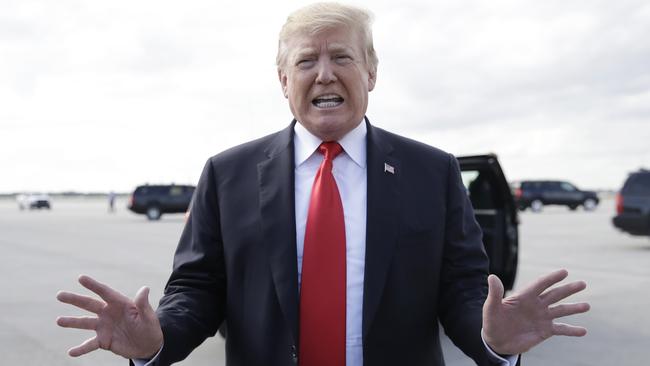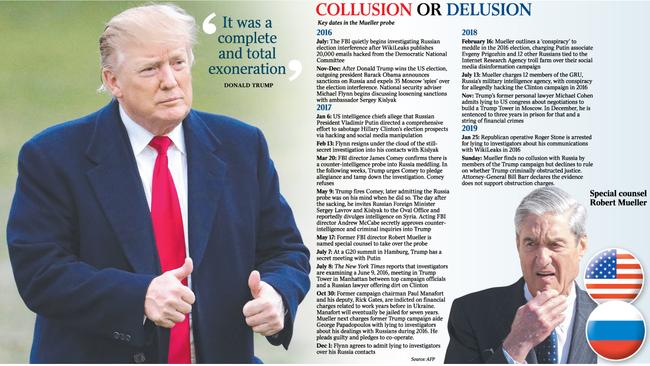
It was an unusually upbeat message from a US President who had worn out his fingers in recent weeks tweeting angrily about the unfairness of special counsel Robert Mueller’s “witch-hunt” against him. “The President is in a remarkably good mood,” Trump’s lawyer Rudy Giuliani observed.
The President had reason to be in a good mood. The day before, Mueller had handed his long-awaited report to the US Justice Department, which confirmed one crucial recommendation: no new indictments.
But as Trump stepped on to the golf course he could hardly have imagined what a “great day” he was about to have.
In the middle of the afternoon, the four-page summary of the Mueller report by Attorney-General William Barr was delivered to congress and made public.
After 22 painstaking months of investigation involving 2800 subpoenas, 500 search warrants, 230 orders for communication records and 500 witness interviews, the principal findings of Mueller’s Russia probe finally were released.
Americans had been waiting for this moment, hoping it would reinforce their prejudices for or against their mercurial President.

Democrats had hoped it would be the powder keg that would explode the Trump administration, while Republicans were simply hoping any damage to the President would be minimal.
President’s best day
In the end, the Mueller investigation — which Trump repeatedly derided as a “witch-hunt” orchestrated by “angry Democrats” — delivered a hefty political blow to … the Democrats. It was the best day of his presidency.
The short summary of the report by Barr delivered Trump as much good news as he could reasonably have hoped for.
No charges will be levied against the President or any of his family and current associates. There are no sealed indictments to haunt them years from now. And Mueller made clear the decision not to recommend charges against Trump was not linked to the Justice Department’s position that it was illegal to indict a sitting president. Most important, it cleared Trump and his campaign team from any allegation that they had colluded or co-ordinated with Russia to help influence the outcome of the 2016 election.
Trump always declared the issue of collusion was absurd. But some events deserved Mueller’s scrutiny, such as the so-called Trump Tower meeting in 2016 attended by the President’s son, Donald Jr, with a Kremlin-linked Russian lawyer to get dirt on Democrat presidential contender Hillary Clinton. And there were questions about whether the President’s long-time adviser, Roger Stone, had contacted Trump to tip him off about an imminent dump from WikiLeaks of Russian hacked Democrat emails.
In the end Barr says Mueller was definitive in his findings. “The special counsel did not find that the Trump campaign, or anyone associated with it, conspired or co-ordinated with the Russian government in these efforts, despite multiple offers from Russian-affiliated individuals to assist the Trump campaign,” he wrote.
The most talked about part of Mueller’s report is his surprise decision not to make a finding on the contentious issue of whether Trump obstructed justice.
Barr’s summary says: “For each of the relevant actions investigated, the report sets out evidence on both sides of the question and leaves unresolved what the special counsel views as ‘difficult issues’ of law and fact concerning whether the President’s actions and intent could be viewed as obstruction.
“The special counsel states that ‘while this report does not conclude that the President committed a crime, it also does not exonerate him’.”
Barr’s letter does not reveal which specific events Mueller is referring to but we know the special counsel examined at least two possible examples.
The first was Trump’s sacking of former FBI director James Comey in May 2017 when the FBI was overseeing the Russia investigation. Trump claimed the sacking was because of Comey’s mishandling of the Clinton emails, but in an interview shortly afterwards he contradicted this by claiming the Russia investigation was on his mind when he dismissed the FBI director.
The second was Comey’s claim that Trump pressured him to drop the FBI’s investigation of the President’s former national security adviser, Michael Flynn. Trump denied this version.
Mueller would be able to charge Trump with obstruction of justice only if, as Barr puts it, he could “prove beyond reasonable doubt that a person, acting with corrupt intent, engaged in obstructive conduct”. Without supporting evidence in either of these cases, it is hard to see how Mueller could have made a solid case against the President for obstructing justice.
Suspicion lingers
However, Mueller appears to suspect Trump may have behaved with bad intent even if it did not reach the level of a provable indictable crime. Otherwise he would not have added the line that the report “also does not exonerate him”. This line is the only ray of hope for the Democrats in Barr’s summary of the Mueller report, and they will exploit it.
Democrats are unhappy that Barr yesterday looked at Mueller’s arguments on the pros and cons of obstruction charges and decided, along with Deputy Attorney-General Rod Rosenstein, that the Justice Department would not pursue any charges. “Special counsel Mueller worked for 22 months to determine the extent to which President Trump obstructed justice,” house judiciary committee chairman Jerrold Nadler, a Democrat, tweeted. “Attorney-General Barr took 2 days to tell the American people that while the President is not exonerated, there will be no action by DOJ (Department of Justice).”
The irony of yesterday’s news is that Trump and the Republicans who had attacked the Mueller investigation now will embrace its findings as a true and fair vindication of the President.
Meanwhile, the Democrats are questioning Mueller’s work.
“It was a mistake to rely on written responses by the President,” Democrat house intelligence committee chairman Adam Schiff said of Mueller. “If you really want the truth, you need to put people under oath, and that should have been done.”
Mueller did choose the second best option for any prosecutor by submitting written questions to Trump and receiving written answers rather than interviewing him face to face. But Mueller’s legal options were limited because most legal experts say you cannot subpoena a sitting president and therefore such a request, if opposed by Trump, would have ended up in the Supreme Court.
During the past year Trump oscillated between saying he was happy to be interviewed by Mueller and refusing to participate. Trump lawyers advised him not to speak to Mueller, knowing his loose and often contradictory manner of speaking made him vulnerable to perjuring himself.
Mueller’s dragnet
It is difficult for either side of US politics to sustain the argument that Mueller’s long investigation was not worthwhile. It resulted in charges against 34 people and three entities. It identified the Russian groups that used social media to manipulate US public opinion in the 2016 election, and also the Russians who hacked and disseminated Democrat emails to interfere in the poll. As such, it will help the US identify and respond to future efforts by Russia and other powers to interfere in US elections or divide public opinion.
Mueller’s large dragnet also caught five former Trump associates for various grubby acts from bank and tax fraud to lying to prosecutors. Those charged include former Trump campaign manager Paul Manafort, former deputy campaign manager Rick Gates, former Trump lawyer Michael Cohen and former campaign adviser George Papadopoulos.
A sixth former Trump associate and long-time friend, Roger Stone, was indicted in January and accused of lying to congress. While their criminal dealings did not relate to Trump’s time as president, they are collateral victims of Mueller’s investigation.
Democrat options
The options now for the Democrats are relatively limited. They will push for the full release of the Mueller report to see if they can find damaging evidence that Barr did not describe in his summary.
They also will use the equivocal conclusion of Mueller in relation to Trump’s obstruction of justice to pursue this issue in Democrat-controlled house committees. And they will continue with their wide-ranging investigations of Trump’s life, ranging from his taxes to his business interests and possible campaign finance violations.
So Trump will continue to face a raft of investigations but the Mueller report robs the Democrats of much of the fuel they had hoped to pour on to this fire. It is now difficult to mount a convincing argument to impeach the President.
Conversely, Trump will seek to turn the tables on the Democrats by using Mueller’s findings as a line of attack against them ahead of next year’s election. Trump’s claim yesterday that he was the victim of an “illegal take-down that failed” gives some idea of the offensive he is planning. “Hopefully somebody is going to look at the other side,” he said.
The Mueller report has given the President a much-needed win but the heat in Washington is rising fast.




“Good Morning, Have A Great Day!” Donald Trump tweeted early yesterday before he played a round of golf in Florida.